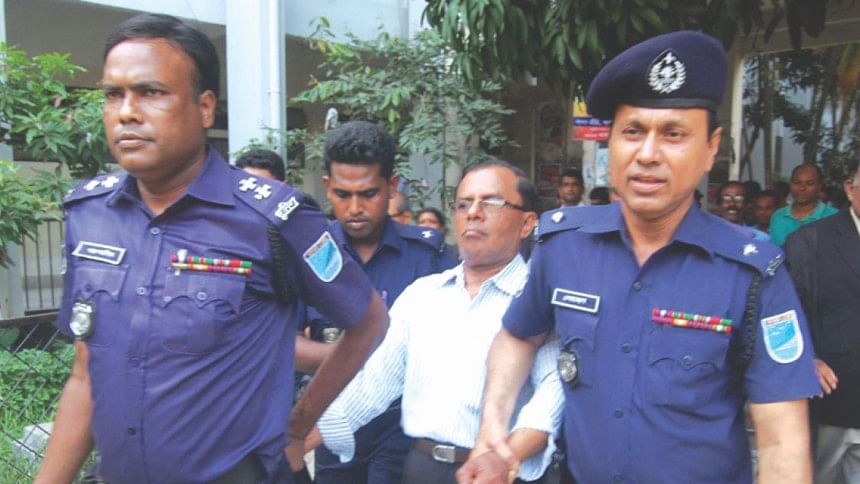A victim of an ugly conspiracy?

On September 27, a Narayanganj lower court accepted the bribery charges pressed against Shyamal Kanti Bhakta, the headmaster of Piyar Sattar Latif High School. In August last year, the high court rejected a police probe report and ordered judicial inquiry into the public humiliation Bhakta had been subjected to on May 13, 2017.
The judicial probe report by the chief judicial magistrate of Dhaka was submitted before the same court in January this year. While we are still waiting to know its contents, we cannot help but feel dismayed by the outcome of this case. Shyamal Kanti Bhakta was disgraced and humiliated by a local leader and his acquaintances for making anti-religious (later proven to be baseless and staged) comments. People from all walks of the country protested this humiliation. We stood by him, chanted slogans, flooded social media with reactions and wrote opinion pieces demanding justice. With the high court's move, we thought that justice had found the right course.
Two months after the incident his fellow English teacher Morsheda Begum filed a bribery case against Bhakta on July 27. She claimed he had taken a bribe even before in December 2014. Morsheda Begum alleged that she bribed Shyamal Kanti a total of Tk one lakh and thirty-five thousand in two instalments to get her enrolled in the monthly payment order (MPO) system.
The curious part of this case is that she waited more than 18 months. The whole country was shocked to see a lawmaker involved in such a disgraceful act. The police probe did not find any truth in the incident involving Shyamal Kanti.
But there are many questions that need to be answered. Why did the plaintiff wait for so long to file the bribery case? Why did she become active only after a local leader was blamed and strongly condemned for his act? Even if we get answers to all these questions, we will not get anywhere. Why did she have to bribe for MPO enrolment? Is this a very common practice in Bangladesh? The amount she bribed is not a small amount of money and it is somewhat difficult for a non-MPO teacher to collect this amount. How did she manage to get this much money to bribe her boss? Bribery is such a disgraceful and punishable offense that everyone will think twice before lodging any case that s/he has done so. State agencies like Anti-Corruption Commission may file a case if they obtain any hard evidence of bribery or attempted bribery. But it is almost impossible that someone will willingly file a bribery case in which s/he paid a sum of money with a specific purpose to get unlawful or unethical benefits. Because bribing someone is also a criminal offense according to the Prevention of Corruption Act, 1947—an offence punishable under section 161 or section 165 of the Penal Code of 1860, it is proved that an accused person has accepted or obtained, or has agreed to accept or attempted to obtain, for himself or for any other person, any gratification (other than legal remuneration) or any valuable thing from any person. The Penal Code also prohibits a public servant from accepting a bribe (sections 161 and 165 Penal Code) and penalises the abetment of this offence (section 165A Penal Code).
When Shyamal Kanti was humiliated, at least two influential ministers came down heavily on the incident and promised to bring the perpetrators to justice. The education ministry probe committee found no evidence against the allegations but found a longstanding dispute between the headmaster and the SMC over financial matters which led to this conspiracy. Based on the recommendations, the ministry also scrapped the decision of the School Managing Committee (SMC) and reinstated him. Taking into cognisance of the then ongoing investigation, the high court scrapped two cases filed by Rina Begum (May 8, 2016) for torturing her son and Samsul Haque Samsu (May 13, 2016) for hurting religious sentiments of the Muslims.
The third one was a different one that landed him in jail. As it is a sub judice matter, it would not be right to comment on this. But there are a few issues that need to be analysed and answered. Our law enforcing agencies have their achievements. But when it comes to Narayanganj, we all see a blurry picture of the influence on every single affair of the district. As if, it is an independent state and above the constitution and laws of Bangladesh.
According to a police report, Shyamal Kanti took the bribe. But as stated above, Morsheda Begum also committed a crime by bribing him (according to prevention of corruption act 1947). Did the investigation officer take this fact into consideration? If not, we can assume that this is yet another attempt to defame Shyamal Kanti. We can only hope that might will never win over right and Shyamal Kanti will get justice.
Meer Ahsan Habib is a communication for development professional.
E-mail: [email protected]





Comments